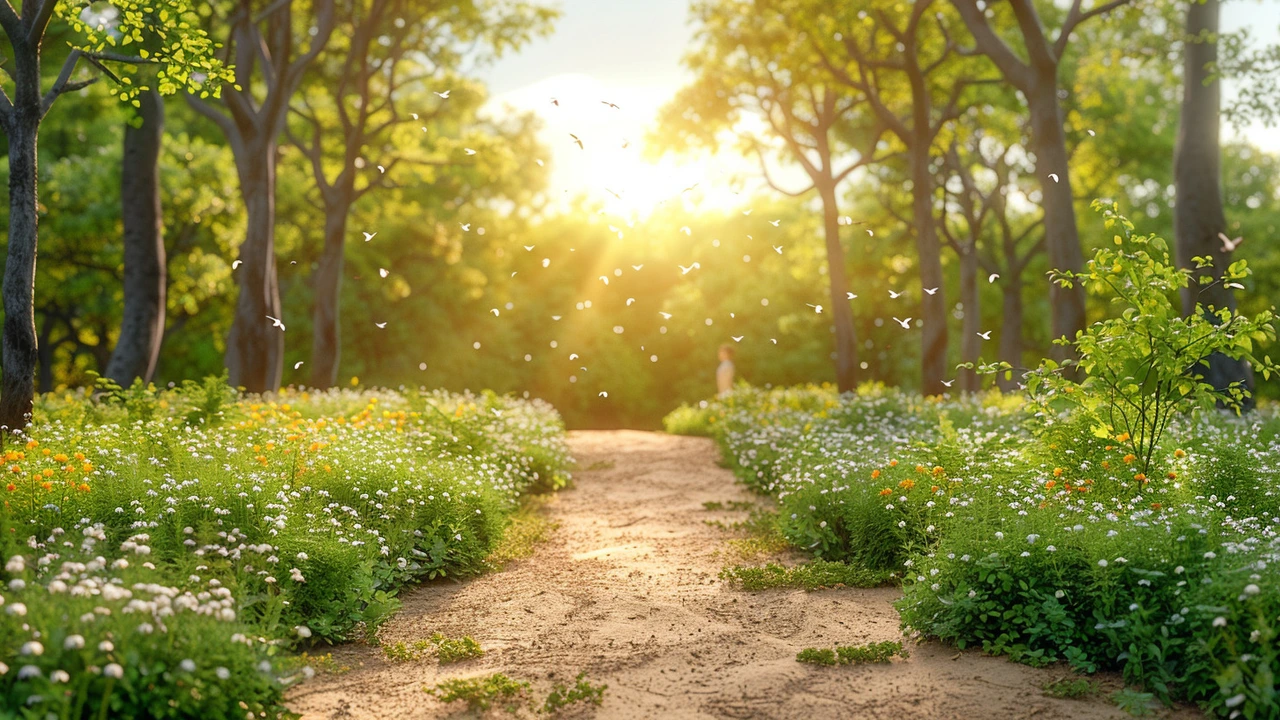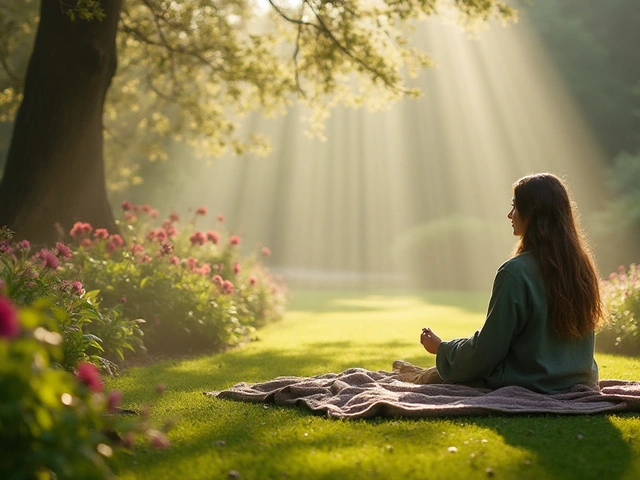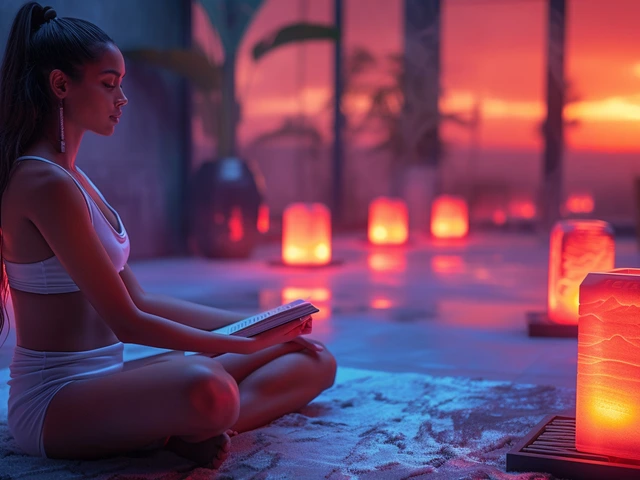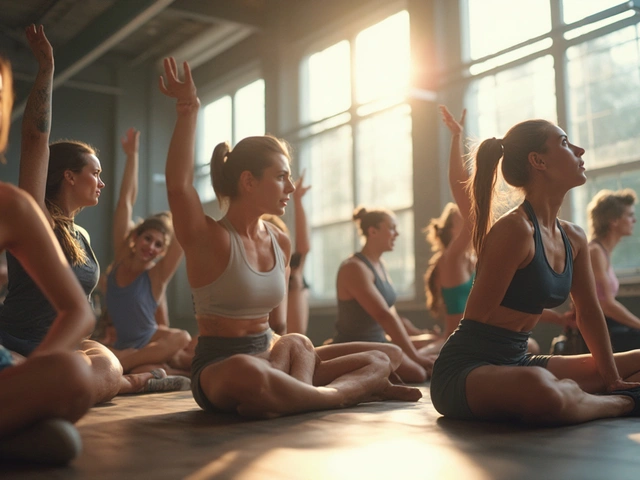In today's fast-paced world, finding balance often feels like an elusive goal. However, adopting the right relaxation techniques can help pave the way to a harmonious lifestyle.
Understanding how to unwind isn’t just about taking a break; it's about integrating practical habits that sustain your mental and emotional well-being. Simple practices like deep breathing, connecting with nature, and indulging in creative activities can make a world of difference. In the following sections, you’ll explore various methods that can seamlessly fit into your daily life and boost your journey toward serenity.
- Understanding Relaxation
- Benefits of Relaxation Techniques
- Deep Breathing Exercises
- Nature and Outdoor Activities
- Creative Outlets for Relaxation
- Creating a Personalized Relaxation Routine
Understanding Relaxation
Relaxation is not just a trendy concept; it plays a crucial role in maintaining a healthy and balanced lifestyle. To put it simply, relaxation refers to the process of reducing stress and tension in the mind and body. This reduction can happen through various techniques such as meditation, deep breathing, or even engaging in hobbies. Taking time to relax helps combat the negative effects of stress, which can lead to a range of health issues including high blood pressure, heart disease, and anxiety disorders.
One essential fact to consider: the American Psychological Association reports that chronic stress is linked to the six leading causes of death. Given that statistic, finding effective ways to relax isn't just beneficial; it's vital. Relaxation helps to decrease cortisol levels, known as the stress hormone, and promotes a sense of calm. When practiced regularly, relaxation techniques can improve mood, boost immune function, and enhance overall well-being.
How does one truly achieve relaxation? It all starts with understanding different methods and finding what works for you. It could be as simple as taking a walk in the park or indulging in a good book. Each person is unique, meaning what might be relaxing for one might not be the same for another. This personal approach is what makes relaxation so versatile and accessible.
Many experts emphasize the importance of mindfulness in relaxation. Mindfulness involves being present in the moment and fully engaging with your current activity without being distracted by past or future concerns. This practice has been shown to reduce symptoms of depression and anxiety significantly. A study published in the Journal of the American Medical Association found that mindfulness-based therapy was effective in treating anxiety and mood disorders.
"The greatest weapon against stress is our ability to choose one thought over another." — William James
Historical practices like yoga and tai chi have also been proven to be effective relaxation techniques. These practices incorporate both physical postures and mental focus, providing a holistic approach to relaxation. Regular practice can enhance flexibility, concentration, and overall stress management. The benefits of relaxation aren't just short-term. Regular practice can lead to long-lasting change in how your body handles stress. This can result in improved sleep patterns, better relationships, and a more positive outlook on life.
Bottom line: relaxation is a key element to a balanced lifestyle. By exploring different techniques and incorporating them into your daily routine, you can create a more harmonious and fulfilling life.
Benefits of Relaxation Techniques
Relaxation techniques are more than just a way to unwind; they bring a whole range of benefits to your mental, physical, and emotional health. Consistent practice of these techniques can significantly reduce stress levels, which is crucial in today's demanding world. When you actively engage in relaxation, your body's stress response decreases, which leads to a drop in heart rate and blood pressure. The simple act of taking deep breaths can help lower cortisol levels, the hormone often associated with stress.
One of the most significant benefits of practicing relaxation methods is the improvement in mental clarity and focus. When your mind isn’t bogged down with stress and anxiety, you can think more clearly and make more rational decisions. This can be particularly beneficial in a work environment, where productivity and creativity often take a hit under excessive stress. Additionally, relaxation techniques such as mindfulness meditation have been shown to improve memory and attention span.
Anxiety and depression are common issues many people face, and regular relaxation practices can be a natural remedy. Techniques like progressive muscle relaxation or guided imagery can help manage symptoms by promoting calmness and reducing the physiological arousal associated with anxiety. A study published in the Journal of Clinical Psychology found that individuals who practiced relaxation techniques experienced a significant reduction in anxiety symptoms.
Engaging in activities like yoga, tai chi, or simple stretching exercises can enhance physical wellness. These practices not only relax the mind but also stretch and relieve tension in the muscles, improve flexibility, and boost your overall energy levels. A healthy body often leads to a healthy mind, creating a cycle of well-being. Physical activity, when combined with deep breathing exercises, can also improve sleep quality, making it easier to fall asleep and stay asleep throughout the night.
Social connections often flourish when you are in a relaxed state. You are more likely to engage positively with others when you feel calm and centered. This can lead to stronger relationships and a better support system. Techniques such as laughter yoga or group meditation sessions can provide a communal benefit, creating a sense of belonging and shared purposes.
It’s interesting to note how relaxation methods can also boost your immune system. Chronic stress can weaken the body's defenses, making you more susceptible to illnesses. On the other hand, relaxation can promote the production of endorphins, which are natural painkillers and mood elevators. According to the Mayo Clinic, these practices can heighten your body's ability to fight off infection and disease.
Dr. Herbert Benson of the Harvard Medical School Mind/Body Institute once said, "Relaxation is a necessity for health and well-being, as it counteracts the harmful effects of stress on the body and mind."
Incorporating these techniques into your daily routine can carve out a sanctuary of peace in your life. It's not just about the immediate sense of calm but long-term benefits that lead to a balanced lifestyle. With patience and consistency, relaxation techniques can transform your life, helping you navigate challenges with grace and composure.

Deep Breathing Exercises
Deep breathing exercises are a powerful tool to combat stress and restore relaxation. By focusing on your breath, you can calm your mind and body, which reduces the harmful effects of stress. It's a method rooted in ancient practices yet fully endorsed by modern science. Deep breathing techniques involve taking full, measured breaths that are generally slower and deeper than those we take in our usual state of being.
To start practicing, find a comfortable place to sit or lie down. Close your eyes if that helps you to focus. Begin by inhaling deeply through your nose, allowing your diaphragm to expand and your lungs to fill with air. Count to four as you breathe in. Hold your breath for a moment before slowly exhaling through your mouth to a count of four. Repeat this process several times, aiming for at least five to ten minutes each day. This exercise is sometimes referred to as the 4-4-4-4 method, and it's widely praised for its simplicity and effectiveness.
An interesting fact is that deep breathing can actually alter the pH of your blood, making it slightly more alkaline. This shift can have a compounding effect on reducing anxiety and enhancing overall feelings of well-being.
Stanford neuroscientist Dr. Andrew Huberman says, "Deep breathing allows the lungs to get more oxygen, which can directly reduce stress hormones in the body."
There are several different styles of deep breathing exercises. One popular technique is called diaphragmatic breathing, also known as belly breathing. It focuses on engaging the diaphragm, a muscle located at the base of your lungs, helping you to breathe more efficiently. Another technique, known as the 4-7-8 breathing method, involves inhaling for four seconds, holding the breath for seven seconds, and exhaling for eight seconds. This method is particularly effective for inducing sleep and promoting deep relaxation.
Studies have shown that consistent practice of deep breathing can lead to numerous health benefits. It can lower blood pressure, improve concentration, and even boost your immune system. Researchers at Harvard Medical School have demonstrated that deep breathing can initiate a "relaxation response" that counteracts the body's fight-or-flight stress reaction. This not only calms the mind but also has a tangible, positive impact on physical health.
If you find it hard to remember to practice deep breathing throughout the day, setting reminders on your phone or incorporating breathing exercises into your routine—such as during your morning coffee or just before bed—can help. Over time, many people find that deep breathing becomes an automatic response to stress, providing an immediate sense of calm and control.
Nature and Outdoor Activities
Immersing yourself in nature has profound effects on mental wellness. Spending time outdoors isn't just a break from routine; it's an opportunity to connect with the world in its most natural form. Various studies have highlighted the benefits of spending time in green spaces, from reducing stress hormones to improving mood and cognitive function. People often find that a simple walk in the park can be therapeutic. The Japanese practice of 'shinrin-yoku' or 'forest bathing' involves taking in the forest atmosphere during a leisurely walk. It's a practice backed by science and suggests nature walks can significantly lower heart rate and blood pressure.
For those who find solace in more strenuous activities, hiking, biking, or even outdoor yoga can be incredibly rewarding. Physical movement in bright, natural environments enhances both body and mind. Sunlight is a natural source of Vitamin D, essential for bone health and mood regulation. The sensory experience of being outside—the rustling leaves, bird songs, or the scent of blooming flowers—can ground you, bringing relief from the hustle of daily life. Whether it's a weekend camping trip or a short daily walk, integrating time in nature nourishes your soul.
Water bodies offer their unique calm. Many people find peace near oceans, lakes, or rivers. The rhythmic sound of waves or rippling water can have a meditative effect. Studies indicate that 'blue spaces'—areas near water—can enhance feelings of well-being. Kayaking, paddleboarding, or simply sitting by the shore can have immense mental health benefits. Cold exposure in natural waters is also known to invigorate the body and elevate the mood, often referred to as 'wild swimming.'
"Nature itself is the best physician." – Hippocrates
Sometimes, the best relaxation therapy is simply to lie down on the grass and gaze at the sky. Cloud-watching is a simple yet often overlooked activity that invites you to use your imagination while relaxing. The slow transformation of clouds can be mesmerizing. Gardens also offer a serene environment. Consider spending time in botanical gardens, where you can appreciate meticulously curated plants and landscapes. The practice of gardening itself, planting seeds and watching them grow, can be a meditative process that enhances your connection to nature.
It's essential to remember that accessibility to nature doesn't require living in the wilderness. Urban parks, community gardens, and even your backyard can serve as your nature escape. Cities worldwide are recognizing the impact of green spaces on mental health and are investing in urban development projects that bring more nature into urban living. Incorporating time for these outdoor activities into your routine can make a significant difference in maintaining a balanced lifestyle.
Integrating Nature Into Daily Life
Here are some practical ways to incorporate nature into your everyday life:
- Daily Walks: Aim for a minimum of 30 minutes outdoors each day.
- Outdoor Hobbies: Pick up hobbies like bird-watching, gardening, or jogging.
- Weekend Trips: Plan regular trips to nearby parks, forests, or beaches.
- Outdoor Exercise: Try yoga or tai chi in your backyard or in a park.
- Mindfulness Outdoors: Practice mindfulness or meditation in a natural setting.
By weaving these activities into your daily routine, you foster a habit of seeking relaxation and balance through nature. These small steps can lead to powerful shifts in your overall well-being and lifestyle.

Creative Outlets for Relaxation
Delving into creative pursuits is more than just a hobby; it's a powerful way to achieve mental and emotional relaxation. Interestingly, many studies have shown that engaging in artistic activities can significantly reduce stress levels, promoting a sense of well-being. Whether it’s painting, crafting, or playing a musical instrument, these activities provide an avenue for self-expression and a break from the daily grind.
One of the most effective and accessible creative outlets is journaling. Keeping a journal allows you to capture your thoughts and feelings, making sense of your inner world. It's not just about recording events but reflecting on them. When done regularly, journaling can help enhance self-awareness and reduce anxiety.
Similarly, painting and drawing are excellent for relaxation. These activities give the mind a break from logical thinking, engaging the right brain's creative side. You don't have to be a professional artist; it's the process of creating that counts. Letting go of perfection and just enjoying the moment can be incredibly fulfilling and calming.
Another fantastic creative outlet is playing a musical instrument. Music has a profound effect on our emotions. Playing an instrument can transport you to another world, offering an escape from everyday stress. Even listening to music can be therapeutic, but creating it yourself takes the experience to another level.
Crafting, such as knitting, crocheting, or woodworking, can also be wonderfully relaxing. These activities require concentration and repetition, which can be meditative. Crafting something with your hands brings a sense of accomplishment and satisfaction, providing a tangible result of your efforts.
Gardening is another creative outlet that also connects you with nature. Planting flowers, vegetables, or even a small herb garden can be incredibly soothing. Watching the plants grow and thrive can give you a sense of purpose and achievement, grounding you in the present moment.
Engaging in these creative outlets doesn’t just provide relaxation but also stimulates your brain in ways that promote emotional resilience and mental sharpness. As Albert Einstein once said, "Creativity is intelligence having fun." Embracing these activities can help you discover new passions and talents, enriching your life.
It's essential to find what works best for you. Experiment with different activities until you find one that resonates with you. The key is to immerse yourself fully and enjoy the process without worrying about the outcome. Remember, the goal is relaxation and joy, not perfection. So grab that paintbrush, journal, instrument, or gardening tools and dive into the world of creative relaxation.
Creating a Personalized Relaxation Routine
Designing your own relaxation routine is a journey toward self-discovery and well-being. Start by identifying what truly calms your mind and body. You don’t need to follow one-size-fits-all solutions. Rather, build your own set of practices that you can look forward to daily. Some people find solace in an evening walk through a park, while others prefer a cozy corner with their favorite book.
Think about the activities that naturally bring you peace. List these out and experiment with incorporating them into different parts of your day. Constant engagement in activities that reduce stress can have profound impacts on your mental health. According to a study published in the Journal of Clinical Psychology, individuals who regularly partake in relaxation exercises report lower levels of anxiety and improved quality of life.
"Taking the time to create a tailored relaxation routine is like offering a gift to your future self," says Dr. Maria Thompson, a renowned psychologist known for her work on stress management.
Another important aspect of personalizing relaxation techniques is considering timing. Some might find that starting the day with a 10-minute meditation session sets a positive tone, while others see benefits in unwinding with a podcast before bed. Recognizing your own rhythms can lead to more effective practices. Creating a relaxation routine is a dynamic process—what works today might need tweaks tomorrow, and that’s perfectly okay.
Steps to Build Your Routine
When setting up your routine, begin with small steps. You don’t need to overhaul your daily schedule all at once. Consistency is key. Here are some steps to help you get started:
- Identify your triggers: Notice what situations lead to stress or anxiety. Is it a crowded workspace? A busy morning? Knowing these can help you avoid or manage triggers.
- Select your methods: Choose at least three activities that help you relax. This could be anything from deep breathing exercises, listening to music, or spending time in nature.
- Schedule them in: Allocate specific times in your day for these activities. Maybe a 5-minute breathing session before work or a short walk during lunch.
- Track your progress: Keep a journal of how you feel before and after practicing your relaxation techniques. This can help you discover what works best for you.
- Be flexible: Life is unpredictable, and your routine should be adaptable. It’s okay to switch things up if something isn’t working.
Incorporating Various Techniques
Diversifying your relaxation methods can keep things interesting and more sustainable in the long run. Imagine you have a rotation of activities you can choose from, each suited for different emotional needs.
For instance, you might have days when you feel restless and need physical activity like yoga or a brisk walk to center yourself. On quieter days, perhaps a guided meditation or soothing music sessions are more appropriate. Keeping a varied toolkit of supportive activities helps prevent your routine from becoming monotonous, maintaining its effectiveness.
Finally, remember that relaxation is deeply personal. What works wonders for one person might not resonate as well with another. Keep observing, keep adjusting, and allow your unique relaxation routine to evolve with you.







